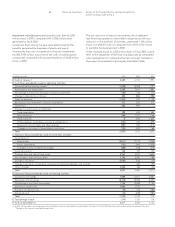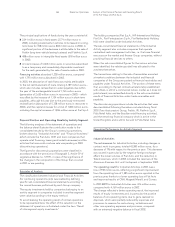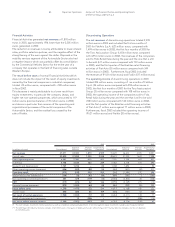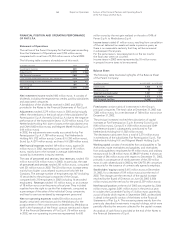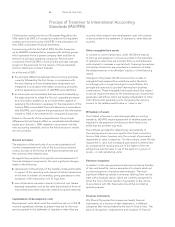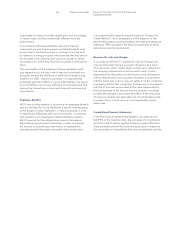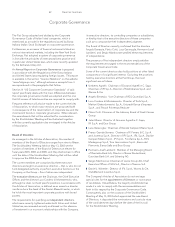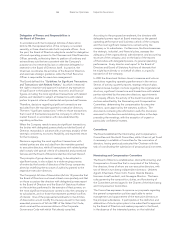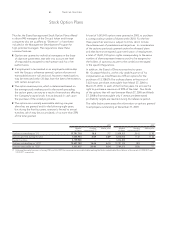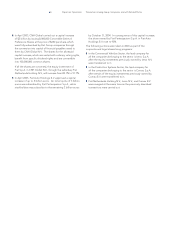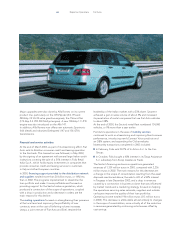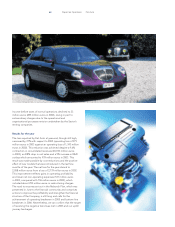Chrysler 2003 Annual Report Download - page 40
Download and view the complete annual report
Please find page 40 of the 2003 Chrysler annual report below. You can navigate through the pages in the report by either clicking on the pages listed below, or by using the keyword search tool below to find specific information within the annual report.
39 Report on Operations
compensation of the Chairman, Chief Executive Officer, and the
other directors with particular duties.
In 2003, the Nominating and Compensation Committee met
five times to discuss the submission to the Board of Directors
of motions concerning the definition of compensation and
stock option plans for the Group’s senior managers and
new appointments at the Group’s Parent Company and for
corporate posts at the lead companies of the various Sectors.
The compensation of directors, as decided by the Stockholders’
Meeting of May 13, 2003, consists of a fixed fee of 50,000 euros
annually, attendance compensation of 3,000 euros for every
board or committee meeting attended, and the proportional
amount of the premium of the insurance policy covering civil
liability resulting from legal and contractual obligations inherent
in the office of director.
The Board of Directors, with the approval of the Board of
Statutory Auditors, granted the Chairman and Chief Executive
Officer a fixed compensation pursuant to Article 2389 of the
Italian Civil Code. Furthermore, as compensation that varies
according to performance, the Chief Executive Officer was
granted stock options whose exercise is partially subject to
satisfaction of predetermined profitability targets by specific dates.
Detailed information on the compensation of directors and
the stock options is provided in the Notes to the Financial
Statements of Fiat S.p.A.
Internal Control System and Audit Committee
In 1993 Fiat published a Code of Ethics, and in May 1999 it
adopted an Internal Control System based on a model derived
from the COSO Report. The Board of Directors then decided to
disseminate an “Internal Control System Policy” and establish
an Audit Committee.
In 2002 a more detailed Charter of the Audit Committee was
drafted and subsequently approved by the Board of Directors.
The “Guidelines for the Internal Control System” were also
drafted to receive the changes made to the Corporate
Governance Code. These guidelines came into effect on
January 1, 2003.
The Audit Committee must be comprised of at least three
independent directors. The mission of the Committee is to
assist the Board of Directors in discharging its own duties by
providing it with advice and proposals concerning: the reliability
of the accounting system and financial information; the Internal
Control System; the choice and supervision of the work of the
external auditors; and supervision of the activities of internal
auditors.
The Committee shall meet on convocation by its Chairman
whenever he deems it appropriate, but at least once every
six months, or whenever the Chairman of the Board of
Statutory Auditors or the Internal Control Compliance Officer
so request. The Chairman of the Board of Statutory Auditors,
or another of its members duly empowered by the Chairman,
and the Internal Control Compliance Officer shall participate
at Committee meetings.
The directors who hold corporate posts, the external auditors,
the Chief Accounting Officer, and possible other parties shall
participate at Committee meetings on invitation by the
Committee Chairman. The Committee shall meet in the
absence of the directors who hold corporate posts at least
twice each fiscal year.
The Committee met seven times in 2003. Its most significant
activities included review of the organizational position of the
Internal Audit function, which now reports directly to the Chief
Executive Officer, with the head of this function now being
vested with the title of Internal Control Compliance Officer
and Compliance Officer pursuant to the Compliance Program
envisaged in Legislative Decree no. 231/2001, and responsibility
for reviewing proposals to renew the contract of the external
auditors, the rules for commissioning work from entities
other than the external auditors and parties related to them
(non-audit services), and the procedures for implementation
of the Disclosures & Controls Procedures in application of
the Sarbanes Oxley Act. During the first quarter of 2004,
the Committee met twice.
This Committee is comprised by three independent Directors:
A. Benessia (Chairman), L. Garavoglia, and S. Marchionne.
The Internal Control Compliance Officer is appointed by the
Board of Directors and is not subject to the jurisdiction of
operating managers but instead reports solely to the Chief
Executive Officer, the Committee, and the Board of Statutory
Auditors.
At present, the Internal Control Compliance Officer is the
head of the Internal Audit function and relies upon the services
performed by Fiat Revi, a highly skilled and capable consortium
company that carries out internal audit within the Group.
An essential part of the Internal Control System, in addition to
the Code of Conduct that replaced the Code of Ethics in 2002,
is the Compliance Program which was adopted following the
Board resolution of February 28, 2003 pursuant to the “Norms
Governing the Administrative Liability of Legal Entities”
envisaged in Legislative Decrees no. 231/2001 and no. 61/2002.
The Compliance Program of the Fiat Group, which was drafted
in conformity with the guidelines prepared by Confindustria
(the Federation of Italian Industries), is comprised of a General
Part and two Special Parts (Offenses Committed in Relations
with Public Agencies, and White Collar Crimes). A Compliance
Officer function was established pursuant to Legislative Decree
no. 231/2001, with the mission of promoting effective and
proper implementation of the Program, including monitoring
of corporate conduct and the right to be constantly informed
about significant activities. Group companies are steadily
adopting compliance programs in conformity with the rules
and general principles envisaged in the compliance program
of the Parent Company after identifying their respective
sensitive processes and the specific procedures to be
implemented at each individual company.
Corporate Governance


